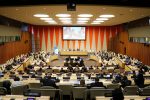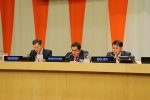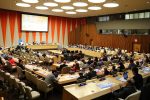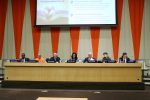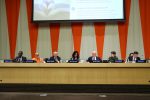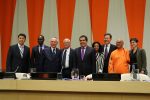REMARKS BY H.E. NASSIR ABDULAZIZ AL-NASSER
UNITED NATIONS HIGH REPRESENTATIVE FOR THE ALLIANCE OF CIVILIZATIONS
“RELIGIOUS LEADERS FOR A SAFE WORLD”
ARRIA FORMULA MEETING
24 APRIL 2018 3PM, CONFERENCE ROOM 4
Co-organized by the United Nations Alliance of Civilizations (UNAOC)
and the Permanent Mission of Kazakhstan to the United Nations
Excellency, Mr. Berik Aryn, Vice Minister for Religious Affairs & Civil Society of the Republic of Kazakhstan,
Excellency Mr. Kairat Umarov, Permanent Representative of Kazakhstan,
Distinguished Religious Leaders,
Distinguished Guests,
Ladies and Gentlemen,
The United Nations Alliance of Civilizations is very pleased to be co-organizing this meeting with the Mission of Kazakhstan.
I welcome H.E Mr. Berik Aryn to NY and I look forward to his briefing on how the “the Congress of the Leaders of World and Traditional Religions,” created in Astana, has evolved since 2003 as well as the upcoming sixth Congress on the topic: “Religious Leaders for a safe world”.
We are also welcoming eminent representatives of various faith-based organizations, to discuss the role of religious leaders and the challenges they face in constructing a safer world.
The efforts of Kazakhstan to sustain peace are not new.
I took part, in 2013, with UNESCO, in the launch of the international Decade (2013-2022) of Rapprochement of Culture, in Astana, hosted by Kazakhstan, convinced that intercultural dialogue is a vital tool in bringing people together. I was also a participant and guest of honor at the “Fifth Congress of the Leader of the World and Traditional Religions,” in Astana (2015). This is not to mention the numerous meetings on Religions for Peace, here in NY with UNAOC and the mission of Kazakhstan.
Since we are looking at a special emphasis on “the conciliatory role of religious leaders in promoting peace,” I am pleased to report that UNAOC’s relationship with Religious Leaders has continued to prosper since the time we initiated and convened a High Level thematic debate on “Promoting Tolerance and reconciliation: Fostering Peaceful, Inclusive Societies on Countering Violent extremism,” in April 2015 here at UNHQs New York with the UN Secretary General and President of the General Assembly.
Out of 35 UNAOC worldwide meetings conducted since 2013, on Interfaith Dialogue in collaboration with the religious leaders, I would like to mention some special ones:
On May 2016 UNAOC co-sponsored with the Religions for Peace and my friend Dr. Bill Vendley in Tokyo, Japan, the High-Level International Consultation with Religions for Peace under the theme: Partnering with religious leaders from the Middle East in advancing the protection of Minorities in Muslim Majority States”. An Action Plan was adopted in favor of a religious education promoting “Global Citizenship”.
On November 2016, we sponsored the “Summit of religious leaders for peace in the Middle East” in Alicante, Spain. The summit concluded with the adoption of the” Alicante Declaration” inspired by the three Abrahamic faiths.
On July 2017, UNAOC brought together in NY, religious leaders from the Holy Land for a Panel discussion on “the role of Religious Leaders in Peace building in the Middle East”. Commitments to implement the Alicante process were made by Spain. The meeting was attended by the UN SG.
It is also worth mentioning that, we organized 6 years in a row the “Interfaith Harmony Week,” bringing together in NY, religious leaders, civil society representatives, Members Sates, policymakers, and representatives of the UN Interagency Task Force on Religion.
At the UNAOC, we strive to provide a platform allowing religious leaders from different faith to work together toward a safer world.
I would like to stress that Religion can be the source of nonviolent transformation, protection of human rights, integrity in government, and reconciliation and stability in divided societies. Religious leaders often have a wide network and the capability of mobilizing support for peace on all levels of society. As we have a full panel composed of representatives of Faith Based Organizations, let’s hear from them how they can strengthen their collaboration with the UN to contribute to a safer world.
What I know for sure is that a peaceful world will not be achieved without our collective work, respecting diversity and promoting social inclusion. The involvement of civil society, religious groups, various government actors, youth, women, the media, the private sector, and cultural and educational leaders has been encouraged to ensure broad and inclusive ownership of plans to prevent violent extremism.
I would like also to mention the efforts of several countries, in training religious leaders. Religious training centers aim to play a leading role in fighting religious radicalism by instilling the values of moderation and tolerance.
The training of religious leaders should bring us to rethink religious education, where religious leaders transform themselves as spiritual mentors and facilitators. They are the one who can create a safe environment where trainers and students are open to each other. Religious leaders offer the opportunity to reflect on forgiveness and reconciliation.
As a Muslim I always like to recall what our Prophet, peace be upon him, said “Shall I not inform you of a better act than fasting, alms and prayers? Making peace between one another.”
Thank you.

